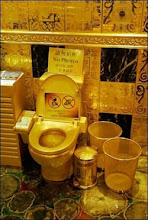The Golden Latrine can still clearly remember the pride he felt at setting up his first bank account. At the time it felt like a rite of passage into the adult world. Nowadays those au fair with the state of British banking might prefer to take the safe option and keep their money
stuffed in a Hello Kitty pillow case under the bed.
It was perhaps naive, if not unreasonable, to hope that the greed, wishful thinking and excessive risk-taking which led to the banking crash in
2008 - an event, lest we forget, that came perilously close to derailing the entire global economy - might have taught the banking industry a lesson. Surely they would have no choice but to clean up their ways and embrace the need for tighter industry regulation, right? Wrong.
Bankers have been under the cosh this week following two major scandals which demonstrate how completely the industry has failed to reform itself. The announcement that four high street banks had been involved in the mis-selling of complex financial products to 28,000 small businesses was dwarfed by the revelation that Barclays had received a £290m fine from regulators for participating in the rigging of the LIBOR (the daily rate set by the British Bankers' Association, governing how much it costs for London's banks to borrow from each other) and the EURIBOR (the same, but for lending between European banks). And in case this sounds like obscure inter-bank politics removed from the real world, consider this: these rates underpin contracts worth $350 trillion worldwide, while the Libor rate impacted on an estimated 250,000 British mortgage holders at any one time over the last decade.
Business secretary Vince Cable penned a strongly-worded piece for The Observer on the need for greater regulation, accountability, and cultural change within the industry, as well as calling for the implementation of the Vickers report (which recommends that bank reinstate the traditional firewall between their commercial banking and investment banking arms, as well as being forced to maintain greater reserves of capital). But what was heartening is that this time the savaging wasn't just from the liberal press. The governor of the Bank of England, Mervyn King, and Lord Turner, chairman of the Financial Services Authority, joined the fray, with the latter decrying the City "culture of cynicism and greed that is quite shocking".
Barclays CEO Bob Diamond has been summoned to the Treasure select committee on Wednesday, although chances are he won't be sweating unduly. This is, after all, the man who, upon being questioned by the same select committee last year about the seemliness of him receiving an £6.5m bonus for 2010 despite woeful trading figures, memorably told them: "There was a period of remorse and apology for banks and I think that period needs to be over." This a mere two years after his bank narrowly avoided the need for nationalisation - although they did greatly benefit from the bailout of the other banks, as their former CEO John Varley acknowledged. Humility is not, I think it's fair to say, Diamond's strong point.
And the revelations continue to flow. In a fascinating blog posted today, the BBC's Robert Peston revealed that managers at Barclays believed they had the Bank of England's tacit approval to manipulate the Libor rate - based on reports of a phone call between Bob Diamond and Paul Tucker, deputy governor of the Bank of England. Tucker firmly denies that he authorised any such thing.
Whatever the results of Diamond's appearance in front of the select committee, what is becoming brazenly clear is that these are not isolated incidents. As The Guardian's Jonathan Freedland wrote:
Just as News International's insistence that phone hacking was confined to a few "rogue reporters" has been revealed as a lie, the idea that a small number of Bollinger-swilling renegades operated unnoticed inside our great British banks is absurd.
Freedland is spot on. This isn't about a few traders overstepping the mark, but yet further evidence of a wanton disregard for rules and regulations within the banking industry. RBS today revealed that they sacked four traders between November 2011 and February 2012 over their alleged involvement in attempts to fix the Libor rate, and there's a sense that the banking profession has been protected from widespread public scrutiny in the past by virtue of its jargon-heavy impenetrability. In other words, whereas anyone can understand a newspaper paying a private investigator to tap the telephone of a dead child's parents, a large percentage of the population are simply too bored by the minutiae of banking to scrutinise the actions of bankers in any detail.
Now, though, there's a definite sense of the veil lifting. Barclay's chairman Marcus Agius has fallen on his sword, Bob Diamond is under pressure to follow suit and Vince Cable is calling for a criminal investigation into the inter-bank rate fixing. For too long the banking industry was given free reign as long as it continued contributing to British GDP on such a lavish scale. The time has come to regulate the banking system properly, but it isn't going to be easy. Our financial sector has the best lobbyists in the game, and incredible access to Downing Street. The lobbyists have already watered down the Vickers report, let's make sure our politicians don't let them dilute it any further.



